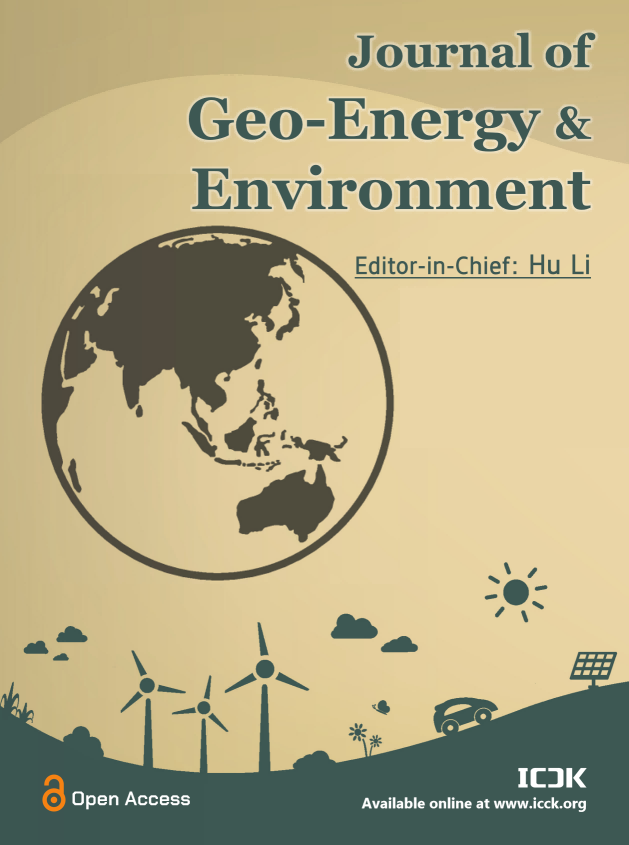About the Journal
About the Journal
Journal of Geo-Energy and Environment
ISSN: 3069-3268
Abbreviation: J. Geo-Energy Environ.
CODEN: JGEE
Publishing model: Open Access
DOI Prefix: 10.62762/JGEE
Official website: https://www.icck.org/jgee
Aims & Scope
Journal of Geo-Energy and Environment (JGEE) is an international, peer-reviewed scholarly journal committed to advancing high-quality, innovative research across the full spectrum of geo-energy and environmental sciences. The journal aspires to serve as a leading global platform for impactful, agenda-setting research that addresses the key global challenges of sustainable energy development and environmental protection.
JGEE welcomes both fundamental scientific advances and practical applied studies, reflecting a dedication to bridging theory and practice in energy and environmental research. Through rigorous scholarship and forward-looking insights, the journal aims to drive progress in meeting the world’s energy needs while safeguarding the environment for future generations. Scope: The scope of JGEE is deliberately broad and interdisciplinary, encompassing traditional fossil energy resources, emerging renewable energy systems, advanced energy storage technologies, and environmental science in a global context. Recognizing the complexity of modern energy and environmental challenges, the journal encourages studies that integrate multiple disciplines – from geoscience and reservoir engineering to materials science, chemistry, environmental engineering, and policy analysis – to develop holistic solutions. JGEE serves an international community of researchers and professionals, fostering collaboration among academia, industry, and policy-makers worldwide. By providing an open forum for exchange of ideas, the journal promotes multidisciplinary innovation and the sharing of knowledge across traditional boundaries. Key topics covered by the journal include, but are not limited to:
• Conventional and unconventional geo-energy resources: Oil, natural gas, coal, and emerging hydrocarbon resources (such as shale formations and gas hydrates) and their efficient, sustainable exploration and production.
• Geothermal energy: Exploration of geothermal resources, geothermal reservoir engineering, and subsurface heat utilization for power generation and direct use applications.
• Renewable and alternative energy systems: Solar, wind, hydroelectric, bioenergy, and other low-carbon energy technologies, including their integration into energy systems and grids.
• Energy storage and conversion technologies: Battery technologies, fuel cells, supercapacitors, hydrogen production and storage, and other methods of storing or converting energy to enhance efficiency and reliability.
• Carbon capture, utilization, and storage (CCUS): Greenhouse gas emission mitigation strategies such as CO₂ capture, sequestration in geological formations, carbon utilization technologies, and related climate change mitigation approaches.
• Environmental science and sustainability: Environmental impacts of energy extraction and use, climate change mitigation and adaptation, pollution control and remediation, ecosystem impacts, and the water-energy nexus in the context of energy development.
• Energy policy and economics: Energy policy analysis, economic and lifecycle assessments of energy systems, environmental economics, regulatory and social implications of energy projects, and studies at the interface of technology and sustainable development.
Publication Frequency
Quarterly
Ownership
![]()
The journal is owned by Institute of Central Computation and Knowledge Inc.
Archiving
All journals published by ICCK are archived in Portico, which provides permanent digital archiving for scholarly journals.
Copyright and Licensing
Articles published in Journal of Geo-Energy and Environment will be Open-Access articles distributed under the terms and conditions of the Creative Commons Attribution 4.0 International (CC BY). Under this license, author(s) retain ownership of the copyright for their article, but authors allow anyone to download, reuse, reprint, distribute, and/or copy articles published in JGEE, so long as the original author(s) and source are cited.
Peer Review
The journal adheres to rigorous peer review and undergoes single-blind peer review. For more details, please refer to Editorial Process and Peer Review Policy.
Editorial Process
All manuscripts submitted to JGEE should adhere to journal's Editorial Process.
Plagiarism
Plagiarism detection is performed at ICCK using the iThenticate- Crossref Similarity Checking tool. This web-based tool is employed in the editorial process to identify potential text plagiarism. It's important to note that while iThenticate can identify matching text, it cannot independently determine whether plagiarism has occurred. Manual examination of the matching text is still necessary, and judgment must be exercised to ascertain the presence or absence of plagiarism. The similarity report might be sent to the author for revision whenever needed.
Publication Ethics Statement
ICCK is responsible for implementing rigorous peer review and strict ethical policies and standards to ensure that high quality scientific work is added to the field of scholarly publishing. ICCK takes such publishing ethics issues very seriously, and our editors are trained to enforce COPE's Core Practices and Guidelines, with a zero-tolerance policy for plagiarism, data falsification, and other behaviours. To verify the originality of content submitted to our journals, we use iThenticate/Crossref Similarity Check to check submissions against previous publications.
Advertising
The journal does not accept any commercial product advertisements until policy changes otherwise.
Direct Marketing
Journal propagation has been done through the journal website and distribution of an introduction pamphlet. Invitations to submit a manuscript are usually targeted towards presenters at conferences, seminars, or workshops related to the journal's aims and scope.

